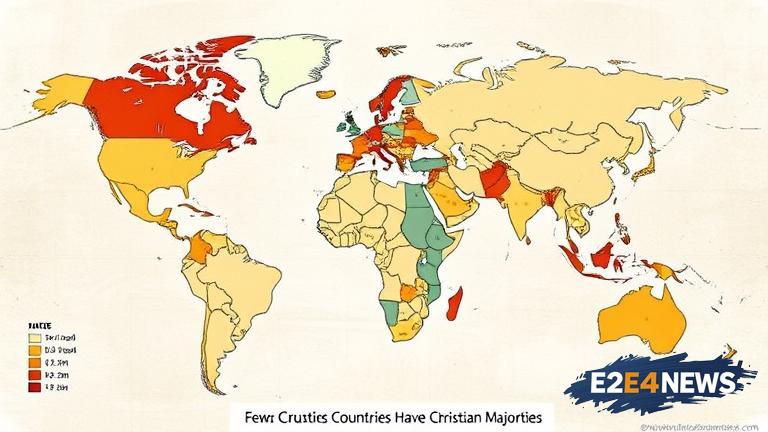The Pew Research Center has released a comprehensive report highlighting a significant decline in the number of countries with Christian majorities. According to the findings, the number of countries with a majority Christian population has decreased substantially over the past few decades. This shift is largely attributed to changing demographics, urbanization, and the rise of secularism. The report notes that in 1910, approximately 95% of the world’s countries had a Christian majority, whereas in 2020, this number had dwindled to around 66%. The decline is more pronounced in certain regions, such as Europe, where the percentage of countries with a Christian majority has dropped from 95% to 55% during the same period. The report also highlights the growth of Christianity in other parts of the world, particularly in sub-Saharan Africa and Asia. Despite this growth, the overall trend suggests that Christianity is becoming increasingly decentralized, with a smaller proportion of countries having a Christian majority. The implications of this shift are far-reaching, with potential consequences for the role of Christianity in global affairs, cultural identity, and social cohesion. The report’s findings have sparked concerns among Christian leaders and scholars, who are grappling with the challenges of adapting to a rapidly changing world. Some have argued that the decline of Christian majorities is a natural consequence of globalization and the increasing diversity of societies. Others have expressed concerns about the potential erosion of Christian values and the impact on communities where Christianity has historically played a dominant role. The Pew Research Center’s report is based on a comprehensive analysis of data from various sources, including census reports, surveys, and other studies. The findings are likely to inform discussions about the future of Christianity, its relationship with other religions, and the evolving role of faith in public life. The report’s authors note that the decline of Christian majorities is not necessarily a reflection of a decline in the number of Christians worldwide, but rather a shift in the distribution of Christians across different countries and regions. As the world becomes increasingly interconnected, the report’s findings highlight the need for greater understanding and cooperation between different faith communities. The decline of Christian majorities also raises questions about the role of Christianity in shaping cultural and social norms, particularly in countries where it is no longer the dominant faith. In response to these changes, some Christian leaders are emphasizing the need for greater engagement with other faith communities and the development of more inclusive and diverse forms of Christianity. The report’s findings are also likely to inform policy debates about issues such as religious freedom, tolerance, and the role of faith in public life. As the global Christian population continues to evolve, it is likely that the Pew Research Center’s report will be widely cited and debated by scholars, policymakers, and faith leaders. The report’s conclusions are based on a rigorous analysis of data and trends, providing a comprehensive overview of the shifting landscape of global Christianity. The decline of Christian majorities is a complex and multifaceted phenomenon, driven by a range of factors, including demographic changes, urbanization, and the rise of secularism. As the world grapples with the implications of these changes, the Pew Research Center’s report provides a timely and authoritative assessment of the current state of global Christianity. The report’s findings are likely to resonate with audiences around the world, sparking discussions and debates about the future of Christianity and its role in shaping global affairs.
